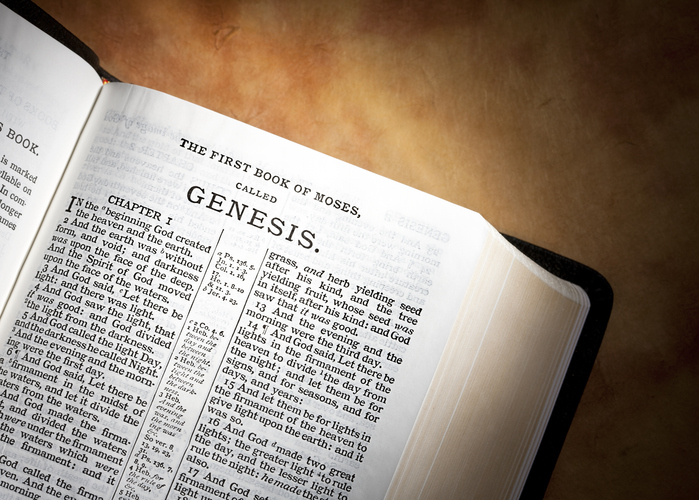Sabbath School Lesson for April 5-11, 2025
Introduction of Lesson 2, The Genesis Foundation
Memory Text: “The next day John saw Jesus coming toward him, and said, ‘Behold! The Lamb of God who takes away the sin of the world!’ ” John 1:29
Although Revelation gets a lot of attention these days, the first book of the Bible holds equal significance for us, as we attempt to unravel the intricate concepts in Revelation’s prophecies. Indeed, all these concepts have roots in the ancient world portrayed in Genesis. The book of beginnings (Genesis) sets the stage for our understanding of the book of the end (Revelation). As they say, it’s hard to know where we’re going, if we don’t know where we’ve come from.
Many “first mentions” are found in Moses’ account of our beginning. It is there that we first learn of God’s love, a sacrificial lamb, what death feels like, and the deceptive nature of the serpent, the devil.
As we see in the memory text, God provided an answer to Isaac’s question addressed to his father in Genesis 22:7, “Where is the lamb for a burnt offering?” John the Baptist enthusiastically identified the Lamb as God’s own dear Son, the Savior of the world.
Through the week:
- Sunday: The Principle of “First Mention”–introducing ideas that are examined in the rest of the Bible
- Monday: Understanding God’s Love–part of God’s character, which Satan has questioned and caused us to misunderstand
- Tuesday: Isaac’s Question–Where Is the Lamb?–the most frequently-used symbol in Revelation is the Lamb
- Wednesday: Dealing With Death–the penalty for disconnecting with the Source of life
- Thursday: The Serpent–the one who deceives the whole world
Sunday: The Principle of “First Mention”
Often, classes in the academic world that offer a general introductory survey of a subject are listed as “101” courses. As a general rule, we also find that when a topic is introduced for the first time, it lays a foundation for understanding that topic later on in the Bible. Although this law of “first mention” is not a solid, ironclad principle, it can definitely be seen as a pattern of how most truths are unfolded gradually by God to His finite creatures.
It’s comforting to know that God’s word stands forever (Isaiah 40:7-8), God does not change (Malachi 3:6), and Jesus is the same yesterday, today, and forever (Hebrews 13:8).
Therefore, keep in mind that the basic truths themselves don’t change, but rather, details are added with each re-telling that enable us to understand what we need to know to follow God in a way that keeps our relationship with Him strong and growing.
Verses and questions:
Isaiah 40:7-8, Malachi 3:6, and Hebrews 13:8
- Why is it important to remember that more details of a concept don’t change the foundational truth itself?
Monday: Understanding God’s Love
The great controversy started in heaven with Lucifer lying about God’s character, questioning His concern and love for His creatures. Therefore, we want to know and understand as much about God’s love as possible to be able to withstand Satan’s continued attacks against God.
We find the first mention of the word “love” in the Scriptures in Genesis 22:2, when Abraham was told to take his only son Isaac, whom he loved, and offer him as a burnt offering. This unusual test of love accurately portrayed the kind of love it took for God to offer His only son, giving Abraham, and all of us, a deeper understanding of God’s sacrificial love.
Later, we find the first mention of love in each of the Gospels as describing the baptism of Jesus, when God declared Jesus to be His beloved Son. He loved His Son too. The connection to Genesis is obvious, helping us grasp the intensity and scope of God’s love. It was just as painful for our heavenly Father to give up His Son, as it had been for Abraham many generations earlier.
Our love continues to be a test of our faith. Loving God and others shows our commitment to the God of love.
Verses and questions:
Genesis 22:1-13
- What can we learn about God’s love in this story about Abraham?
Matthew 3:17, Mark 1:11, Luke 3:22, and John 3:16
- What connection do these verses have to the first mention of love in Genesis?
- What does this discovery in Genesis and later in the Gospels show us about God’s love?
Tuesday: Isaac’s Question–Where Is the Lamb?
Although Abel offered the firstborn of his flock of sheep and was murdered by his brother Cain for it, the actual first mention of the Hebrew word for “lamb”, seh, was in connection with Isaac’s near-sacrifice of himself by his father Abraham. At that tense moment, Isaac asked his father, “Where is the lamb for a burnt offering?” (Genesis 22:7).
God continued to build on the theme of a Lamb, using the institution of the Passover lamb in Exodus 12 and several Messianic prophecies in the Old Testament. The most direct answer to Isaac’s question though is found in the New Testament story of Jesus’ baptism, when His cousin John identified “the Lamb of God who takes away the sin of the world!” (John 1:29). After this baptism, God verified John’s introduction by announcing “This is My beloved Son” (Matthew 3:17).
One of the most frequently-mentioned symbols in the prophetic book of Revelation is that of the Lamb. Jesus is called “the Lamb” more than twenty times in Revelation, with the Lamb being the central player in John’s vision of God’s throne room found in chapters four and five.
Verses and questions:
Genesis 22:7-8, Exodus 12:3, John 1:29, and Revelation 5:6
- Why is the theme of a lamb so important for God to make us understand, and how effective was His teaching in these examples?
Wednesday: Dealing With Death
Death is never a pleasant theme, and yet we hear about it a lot during our short lives on earth. Even the Bible, which is filled with hope and newness of life, is also filled with the unwelcome subject of death. The first encounter that Adam and Eve had with the death of a human being was the traumatic murder of one of their sons.
This event may have been meant to point them to the death of the Son of God, who is our only salvation from death. Jesus and Abel were both innocent victims of unrighteous people. The story of Cain and Abel enhances our understanding of the terrible consequences of sin. It leads to death.
Another death that must have jolted Adam and Eve was the death of animals, when God used animal skins to make coverings for the naked couple. Those skins surely worked better than the fig leaves they had made to cover themselves. The death of Jesus, the precious Lamb of God, now provides us symbolically with a robe of righteousness to cover our sins.
Verses and questions:
Romans 6:23, Genesis 4:4-8, and Revelation 1:18
- What does the story of Cain and Abel teach us about the future sacrifice of God’s Son, and what it means for us today?
Thursday: The Serpent
Satan, according to prophecies, is a superpower when it comes to deceiving the world. Revelation 12:9 says he “deceives the whole world”. And Revelation 13:3 tells us “the whole world marveled and followed the beast”.
We saw Satan’s first attempt to deceive in Genesis 3, when Adam and Eve were persuaded by the serpent to disobey God. The whole world was affected by their unfortunate choice. To be sure, many human beings have followed in their path of sin, and the devil continues to use the same strategy and tools to tempt us today.
Satan flattered Eve by asking her a question, but then twisted the meaning of what God had told them. By doing so, he called God a liar, when in truth it was the serpent who was lying. As for Eve, flattery and name-calling worked and are commonly used by Satan and people today who want more power for themselves. Deflecting the blame to someone or something else is still a sign that deception is going on. Let’s not be deceived by smooth, sweet talk. It is still something we must prayerfully watch out for and resist.
Verses and questions:
Genesis 3:1-6, Revelation 12:9, and Galatians 6:7-10
- How was Satan, through the serpent, able to convince Eve and then, Adam, to disobey God?
- How do we know that Satan still tries to deceive us into sinning?
- How can we prevent ourselves from being deceived?
Friday: Final Thoughts
We mustn’t forget that the best way to understand our present and future is to understand our past. Therefore, all the stories in the Bible are there for the reason of informing us about the meaning of life. They not only guide us when we are faced with difficult life choices, but when we are anxious about the future.
We seem to naturally want knowledge that is new and enlightening, but there is value in using the old stories of the past in the Bible to help us see something new. Using faith, prayer, all our mental faculties and moral sensibilities, will lead us to new and exciting discoveries that will enrich our lives in many ways.
“For whatever things were written before were written for our learning, that we through the patience and comfort of the Scriptures might have hope.” Romans 15:4 NKJV
…and for more about our future, see this:
https://www.outlookmag.org/who-is-the-king-of-kings-and-lord-of-lords/
Next Week: Images From Marriage
To read the Sabbath School Lesson Quarterly and see more resources for its study, go to










